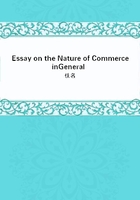
第40章
Further Reflections on the same subject We have seen that the quantity of money circulating in a state may be increased by working the mines which are found in it, by subsidies from foreign powers, by the immigration of Families of foreigners, by the residence of Ambassadors and Travellers, but above all by a regular and annual balance of trade from supplying merchandise to Foreigners and drawing from them at least part of the price in gold and silver. It is by this last means that a state grows most substantially, especially when its trade is accompanied and supported by ample navigation and by a considerable raw produce at home supplying the material necessary for the goods and manufactures sent abroad.
As however the continuation of this Commerce gradually introduces a great abundance of money and little by little increases consumption, and as to meet this much Foreign produce must be brought in, part of the annual balance goes out to pay for it. On the other hand the habit of spending increasing the employment of labourers the prices of manufactured goods always go up. Without fail some foreign countries endeavour to set up for themselves the same kinds of manufactures, and so cease to buy those of the state in question; and though these new establishments of crafts and manufactures be not at first perfect they slacken and even prevent the exportation of those of the neighbouring state into their own country where they can be got cheaper.
Thus it is that the state begins to lose some branches of its profitable trade: and many of its workmen and mechanics who see labour Fallen off leave the state to find more work in the countries with the new manufacture. In spite of this diminution in the balance of trade the custom of importing various products will continue. The articles and manufactures of the state having a great reputation, and the facility of navigation affording the means of sending them at little cost into distant countries, the state will for many years keep the upper hand over the new manufactures of which we have spoken and will still maintain a small Balance of trade, or at least will keep it even. If however some other maritime state tries to perfect the same articles and its navigation at the same time it will owing to the cheapness of its manufactures take away several branches of trade from the state in question. In consequence this state will begin to lose its balance of trade and will be forced to send every year a part of its money abroad to pay for its importations.
Moreover, even if the state in question could keep a balance of trade in its greater abundance of money it is reasonable to suppose that this abundance will not arrive without many wealthy individuals springing up who will plunge into luxury. They will buy pictures and gems from the foreigner, will procure their silks and rare objects, and set such an example of luxury in the state that in spite of the advantage of its ordinary trade its money will flow abroad annually to pay for this luxury. This will gradually impoverish the state and cause it to pass from great power into great weakness.
When a state has arrived at the highest point of wealth (I assume always that the comparative wealth of states consists principally in the respective quantities of money which they possess) it will inevitably fall into poverty by the ordinary course of things. The too great abundance of money, which so long as it lasts forms the power of states, throws them back imperceptibly but naturally into poverty. Thus it would seem that when a state expands by trade and the abundance of money raises the price of land and labour, the Prince or the Legislator ought to withdraw money from circulation, keep it for emergencies, and try to retard its circulation by every means except compulsion and bad faith, so as to forestall the too great dearness of its articles and prevent the drawbacks of luxury.
But as it is not easy to discover the time opportune for this, nor to know when money has become more abundant than it ought to be for the good and preservation of the advantages of the state, the Princes and Heads of Republics, who do not concern themselves much with this sort of knowledge, attach themselves only to make use of the facility which they find through the abundance of their state revenues, to extend their power and to insult other countries on the most frivolous pretexts. And all things considered they do not perhaps so badly in working to perpetuate the glory of their reigns and administrations, and to leave monuments of their power and wealth; for since, according to the natural course of humanity, the state must collapse of itself they do but accelerate its fall a little. Nevertheless it seems that they ought to endeavour to make their power last all the time of their own administration.
It does not need a great many years to raise abundance to the highest point in a state, still fewer are needed to bring it to poverty for lack of commerce and manufactures. Not to speak of the power and fall of the Republic of Venice, the Hanseatic Towns, Flanders and Brabant, the Dutch Republic, etc. who have succeeded each other in the profitable branches of trade, one may say that the power of France has been on the increase only from 1646 (when manufactures of cloths were set up there, which were until then imported) to 1684 when a number of Protestant Undertakers and artisans were driven out of it, and that kingdom has done nothing but recede since this last date.